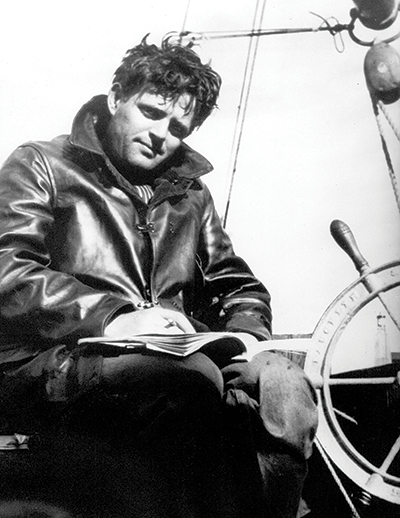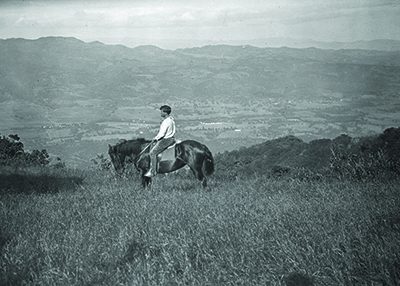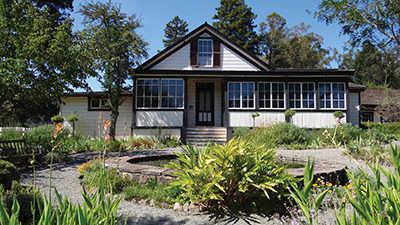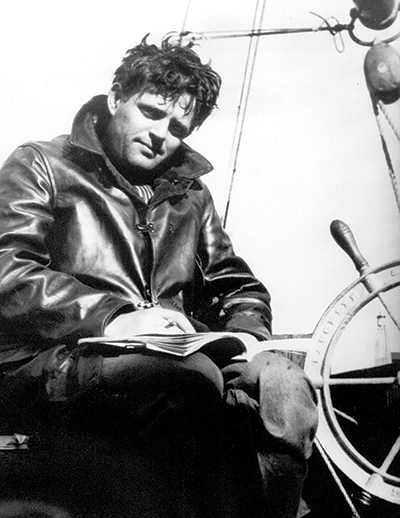
WE’VE NEVER MET, but I feel as if I’ve known you for quite a long time. I’ve read a few of your nearly 25 novels and 100 short stories, and I’ve scanned some of your many essays, plays, poems and newspaper articles. Man, you were prolific!
As a traveler and small-time storyteller, I’ve retraced your journeys to the Yukon, Alaska, Hawaii, the South Pacific, and Australia. And as a native Californian and longtime Bay Area boy I’ve stopped by your birthplace south of Market in San Francisco, hoisted a few where you studied as a kid at Heinold’s First and Last Chance Saloon in an Oakland square named after you and spent many delicious days exploring your beloved Beauty Ranch in the hills above Glen Ellen in Sonoma County. Although you passed away a century ago this November, you’ll be happy to know your spirit is alive and well and your extraordinary legacy as a writer, adventurer, and organic farmer has not been forgotten.
In many ways, you were the first major media celebrity of the modern age. Handsome and charismatic, you hit the big time at the turn of the last century just as new communication technologies allowed newspapers and magazines to reach the masses in far greater numbers than ever before. Your fame was eventually global and you became the highest-paid writer of your time, but you began your life as a local kid, son of an unwed mother of modest means. You were born in 1876, months before Custer’s last stand and years before the closing of the American frontier. The nation and the world changed dramatically in your brief 40 years, and you and your circumstances did, too.
You grew up in Oakland, learned to love books and writing, tried your hand at oyster pirating on the bay, sailed to Japan on a sealing ship, and tramped around the United States, all the while encountering characters and learning lessons that would someday spring to life in the pages of your work. Your restless and unbounded energy led you to join the Klondike Gold Rush in 1897. I once literally followed your footsteps thousands of feet up and over the mountains from the Alaska coast to Lake Bennett in the Yukon Territory on what’s now called the Chilkoot Trail. My pack was much lighter, but you carried 100 pounds of provisions on your back as you chased dreams of the big strike. You developed scurvy and barely survived the harsh northern winter, and though you never found your glittering treasure there you did find your voice as a storyteller.
In 1903, you published a book that grew out of your harrowing year in the Yukon. Call of the Wild was a huge and instantaneous hit. You’ll be pleased to know it’s been published in 47 languages and has touched people all over the world. A Chinese scientist who devoted his life against long odds to saving pandas in the wild once told a colleague of mine he was inspired to protect nature as a little boy when he read Call of the Wild. Apparently, thanks at least in part to you, we still have pandas at large in their native forests.
But for all your journeys and adventures to the far corners of the earth, I always urge people to visit you at home in the place you loved the most, your aptly named Beauty Ranch, now Jack London State Historic Park in Glen Ellen. I’ve heard from those who work in the park that they often feel your presence there. I do as well.

It’s no wonder you chose to purchase the ranch in 1905 and make it your home for the rest of your life. It’s magnificent and ecologically diverse, with paths you once traveled leading to the summit of Sonoma Mountain and to historic structures and personal memories you left behind. We can visit the cottage where you and your wife, Charmian, lived and entertained an eclectic array of friends and where you wrote many of your later works. You were a truly disciplined writer, writing a thousand words a day by hand. Your imagination was fertile, and you needed to pay the bills to keep your fertile ranch growing and afloat financially. In fact, you once said this: “Next to my wife, the ranch is the dearest thing in the world to me. I write for no other purpose than to add to the beauty that now belongs to me.”
Speaking of the ranch, many of us these days don’t realize you loved agriculture as much as writing and were one of the first organic farmers in America. You cared about the health of your land, animals, and products. Since your death, your innovative practices have encouraged other farmers to follow your lead. Mike Benziger and his family have been producing excellent wine just down the hill from you for many years. Mike is absolutely clear that you have been one of his principal inspirations.

Jack, your cottage has been carefully maintained and curated. It looks much the way it did when you died there from various ailments contracted in your life, often hard and always fully lived. Not far away are the ghostly remains of the magnificent home of your dreams that burned to the ground just before you were to move in. The loss of Wolf House in 1913 is often said to have broken your heart and perhaps hastened your death. You’ll have to tell me about that sometime.
And finally, please know that I always try to stop at the top of the small, wooded knoll in the park, off the beaten track, where your ashes lie beneath a lava boulder from Wolf House. I come to pay my respects and marvel that a man who led such a celebrated and monumental life chose such a profoundly simple and unpretentious place to rest and make his final statement. Of course, after my getting to know you a little over the years, it makes perfect sense. And your writing and your ranch will keep speaking for you clearly in the centuries to come.
On the centennial of your death, November 22nd of this year, I’ll toast you and your meteoric life with a fine glass of Benziger wine, and I’ll thank you for all the stories and for all the inspiration.
This article originally appeared in Marin Magazine’s print edition with the headline: “More Than Words”.


